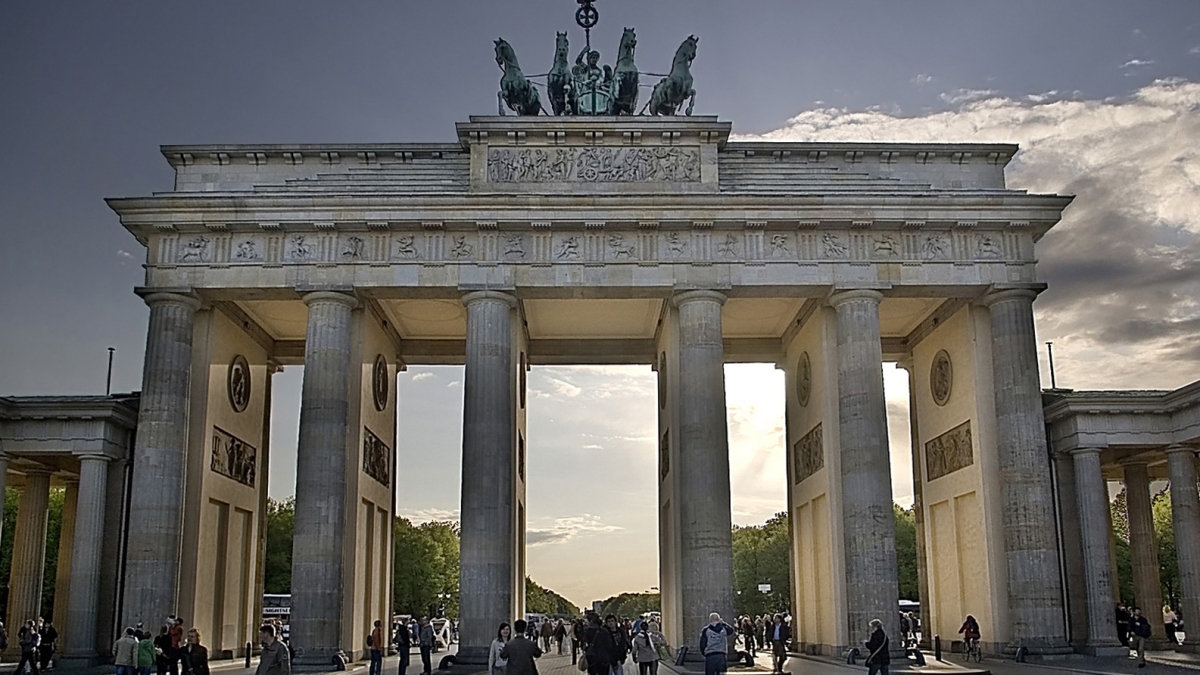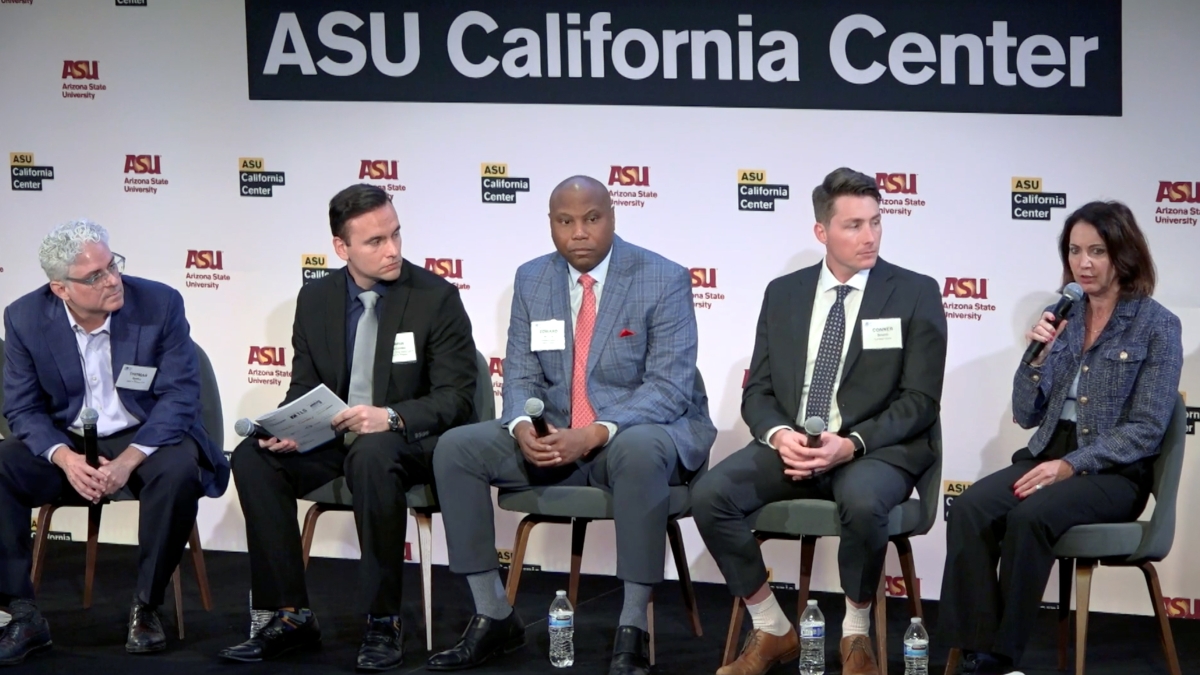ASU events to explore themes of populism, immigration from trans-Atlantic perspective

Two weeks ago Angela Merkel won a fourth term as Germany’s chancellor. At the same time, however, a far-right party, Alternative for Germany, gained a spot in Parliament for the first time in more than 60 years.
The New York Times reported the AfD’s victory showed evidence of “voter anger over immigration and inequality,” with “anxieties over security and national identity” on the rise.
This fall, ASU’s School of International Letters and Cultures and School of Historical, Philosophical and Religious Studies (SHPRS) will host “Germany: Making Choices,” a series of events that will include film screenings, visiting lecturers, a roundtable discussion and a student project competition. The program is supported by funding from the Embassy of the Federal Republic of Germany.
“We wanted students to engage with some of the issues that Germans are engaging with and try to think about ways in which those issues are actually not just specific to Germany but global in many respects,” said Daniel Gilfillan, associate professor of German studies.
Gilfillan worked with SHPRS Assistant Professor Volker Benkert to plan the series of events.
“We don’t want to convert anyone,” Benkert said, “but we want students to be willing to engage the topic of populism, of immigration, of nationalism from many different angles.”
The first event in the series, which is free and open to the public, is the screening of the film “We are Young. We are Strong.” It will take place at 4:30 p.m. Thursday in Wrigley Hall, room 201 on the Tempe campus.
Gilfillan and Benkert sat down with ASU Now ahead of the screening to delve into some of the issues the program will explore.
Question: Why is Angela Merkel’s opening of Germany’s borders to refugees problematic?
Volker Benkert: At least a million [refugees] came [to Germany] in 2015. The number of refugees seeking asylum in Germany now has gone down dramatically to about 200,000 this year. However, this has very little to do with what the German government did and a lot to do with other countries closing their borders.
So Angela Merkel trying to claim that she solved the migration crisis is a very difficult claim to make. I think she’s doing the right thing, she’s trying to think about how we can make decisions about asylum in the countries where people are from ... But it’s a humanitarian crisis that has been looming for a long time and that Angela Merkel failed to acknowledge until it was literally on Germany’s doorstep.
So she decided, without consulting the federal government or consulting European partners, to open Germany’s borders for refugees. The humanitarian act is laudable, but we have ignored the problem so long that even today what Germany can actually do to solve the refugee crisis is very limited. Germany has no impact on what’s going on in the Middle East, in Syria; it’s a war zone, it has been for a long time. The German government has no leverage to change that in any way. … So at the end of the day, if Merkel claims that this was a one-time humanitarian crisis where Germany had to step up to the plate … that argument is laudable, but that humanitarian crisis still exists.
Daniel Gilfillan: This was and still remains one of the issues behind voters’ choices at the ballot box. And I think that had a great influence on how they voted. So we now have what we can describe as an extreme right party, the Alternative for Germany party, winning enough percentage of the vote to have seats in Parliament. They’ll be the third-largest party in the German government for the first time in 60 years.
Q: Why should Americans be paying attention to this?
Gilfillan: One of the themes we’re exploring through this programming is rising populism and nationalism, not just in Europe and Germany but globally. I was attracted to that topic from the idea of immigration and the refugee crisis, which is a global issue.
Benkert: We also want to explore this theme of transatlantic populism. [One of our visiting lecturers] will discuss the themes that pervade populism both in the United States as well as in Germany. And in fact, there are quite a lot. There is a certain amount of fear-mongering, there is a certain amount of xenophobia. But there is also this very clear critique of existing structures that don’t seem to offer solutions to real problems. [For example], illegal immigration.
Because illegal immigration is real, and it is a problem, and the American government has not found a solution to that. When Angela Merkel opened the border, populists in Germany argued that she violated constitutional rights because it was just not her call. And they do have a point there. So there’s a perception among these populists — and I think that they exploit this for very problematic causes — that the existing parties are unable to solve problems. You’ve got immigration, you’ve got globalization, movement of jobs and people who feel left behind, the blue-collar workers … And these are very complex problems that clearly any government will have a very hard time solving. But that alleged weakness of existing structures is exploited into a narrative that these structures are somehow wrong.
Q: Why the focus on immigration?
Gilfillan: My idea was to try to engage students in thinking about what’s going on beyond our own borders, and to look at the humanitarian side of these issues. Immigration is a sort of a hub issue that brings together serious questions about the impact of war, the impact of climate change, the impact of economic disparity … And these types of issues run deep, and this [situation in Germany] is just one of the reactions when those deep issues aren’t addressed adequately. There are these micro-connections between what a lot of Americans consider to be single issues. They don’t understand necessarily that below them, behind them, beyond them, there are these underlying reasons for why people are on the move. And I think it’s not going to be solved overnight, but I also don’t think the tide of refugees is going to ebb any time soon. I think with climate change, especially, we will be seeing more and more of it.
Benkert: Immigration poses the question of: Who is an American? Who is a German? What does it take to become an American? What does it take to become a German? What is, essentially, the nation state? If the defining feature of a nation state is that it has borders, and Angela Merkel says you can just come in, what then? And there are other things that challenge the nation state as well. There are global corporations that wield enormous powers that transcend the nation state, and even play nation states against each other. So the big question is, in this age of globalization, where does that leave the nation state? Which, after all, is the paradigm under which we all live. We pay taxes to the nation state; we follow the laws of the nation state. And I think that’s the question that, especially this election in Germany now poses because there is now a party that clearly has the idea that German-ness is connected to your ancestry and who obviously wants to make it much more difficult for others to become German. And that sentiment, I think, is the same [in America].
Q: How does that nationalist sentiment get spurred on?
Gilfillan: The German film we’re showing this week, “We Are Young. We Are Strong,” is about a very specific incident in the northeastern city of Rostock, just after unification, in which there was a riot around a group of asylum homes that was spearheaded by some neo-Nazi groups but then eventually joined by regular German citizens, ostensibly because of feelings of disenfranchisement.
Benkert: There’s also a very tender love story built into that because there’s always a chance for this group of people to not set those homes of asylum seekers on fire. To find opportunities to find love, to do what young people do. So I appreciate that deeply because no one is born a neo-Nazi. It is societal disappointments that socialize you in a way that you become susceptible to this kind of rhetoric. So these far-right populists that we see, both in America as well as in Germany, are not just as helpless victims of propaganda but [are influenced] by deeper problems in our society that obviously we have failed to address. So where do we as a society fail that we get to this point where we are right now, with two deeply divided societies. With the emergence of, in both countries, I think it’s fair to say, kind of a rhetoric from the right that is deeply disturbing.
For more information about the film series, including a list of upcoming screenings, click here.
Top photo: Brandenburg Gate in Berlin. Photo by Sven Gross-Selbeck (Own work) [GFDL (http://www.gnu.org/copyleft/fdl.html) or CC BY-SA 3.0 (https://creativecommons.org/licenses/by-sa/3.0)], via Wikimedia Commons
More Law, journalism and politics

TechTainment conference explores the crossroads of law, technology, entertainment
What protections do writers, actors, producers and others have from AI? Will changing laws around name, image and likeness (NIL) eliminate less lucrative college sports programs?And what does…

How to watch an election
Every election night, adrenaline pumps through newsrooms across the country as journalists take the pulse of democracy. We gathered three veteran reporters — each of them faculty at the Walter…
Law experts, students gather to celebrate ASU Indian Legal Program
Although she's achieved much in Washington, D.C., Mikaela Bledsoe Downes’ education is bringing her closer to her intended destination — returning home to the Winnebago tribe in Nebraska with her…